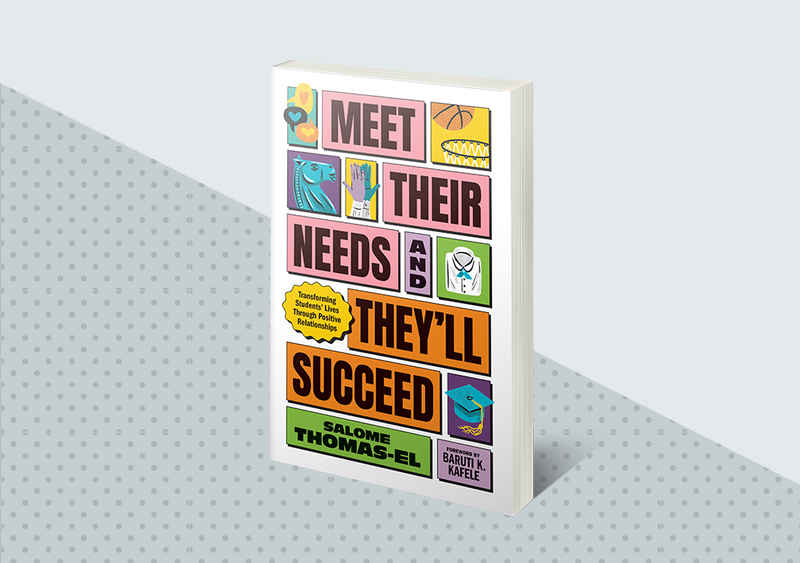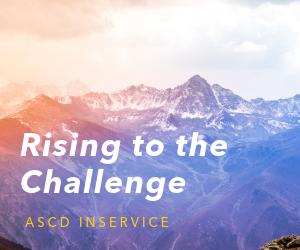Every student deserves to know they matter. In Meet Their Needs, and They'll Succeed: Transforming Students' Lives Through Positive Relationships (ASCD, 2025), Principal Salome Thomas-EL shares how positive connections transform education, turning classrooms into launching pads for future success.
"Principal EL" draws from extensive experience to present his "Four Cs" approach: being crazy about kids, curious about their lives, consistent in support, and committed to creating cultures where students feel valued. This book offers both inspiration and practical strategies—from fostering critical thinking skills to supporting trauma-affected youth to building after-school programs that change lives.
In this excerpt, Thomas-EL recounts a personal experience that deepened his understanding of what makes relationships transformative, reinforcing his conviction that when students know they're seen and supported, they flourish.
I could hear the door opening and closing, but I couldn’t see anyone moving in the room. Then a nurse appeared from behind the curtain that circled my bed. “I’m sorry for waking you, Mr. Thomas-EL,” the nurse said to me. “I’d like to apologize ahead of time. You’ll get very little sleep tonight. The doctors want us to wake our patients every two hours to check their vitals, oxygen, and pain levels.”
For the first time in my nearly 57 years on this earth, I was sleeping in a hospital bed—and on Father’s Day, of all days! After experiencing stomach pain and chills all day Saturday, I finally went to the emergency room on Sunday morning. I had thought the doctor might tell me I had COVID-19, because we were in the middle of a pandemic, but no: my appendix had burst, and I needed immediate surgery. So, here I was, successfully down an appendix and being woken up every two hours by a nurse asking me questions about my life to distract me from painful things required to get fluids and medicine into my body.
“So what do you do for a living, Mr. Thomas-EL?”
I was tired and wanted to sleep, so I just told her I was a school principal in Wilmington, Delaware. She would be OK with this little snippet of small talk, right?
Nope! She wasn’t.
“Wow, that’s amazing!” my nurse exclaimed. “How are the kids?” Now what could I do? I had to tell her the whole story about our wonderful students, teachers, and staff. About our national champion chess program and my earlier career working in Philadelphia schools. She wanted to know if I liked my job. I told her that I absolutely loved it. “It’s hard work, but it’s God’s work,” I said, groggily doing my best to make conversation in the middle of the night.
When the nurse returned that evening, she rushed into my room, loudly calling out my name: “Principal EL!”
I thought I was in big trouble. Few people who don’t know me well call me “Principal EL.” She went on to explain how she had looked up our school’s chess team online and found so much information about them and about me as well. “You conveniently left out how you have been on Dr. Oz’s TV show!” she reprimanded. “And that you write books and have met Will Smith! I called my family and said, ‘Look who my patient is!’”
At a time when I was physically near my worst, it felt good to hear someone say they appreciated the work of educators.
What stood out to me, then and now, was the way this nurse repeatedly expressed pride in the work I’d done for decades as a teacher and principal. At a time when I was physically near my worst, it felt good to hear someone say they appreciated the work of educators.
The way this nurse treated me while I was in pain and struggling made me feel special, like I mattered to her, like I had an advocate looking out for me. It reminded me of what I wanted to do for all my students when I was a teacher, and it reminded me of what I expected from my teachers as a principal: to recognize all students’ fundamental humanity as well as their specific individuality. To create a space that’s engaging and joyful for kids in the middle of anything painful or challenging that might be going on in their lives outside our school.
Every student should feel that they matter and are important. As educators, our goal each day should be to give our students what they need to succeed in school and in life. That means we must be prepared to reach out to them and meet them where they are, as they are. Yes, even though, initially, they may be as reluctant to engage as I was when my wonderful overnight nurse first reached out to me.
Now I just told you a story about one nurse who cared for me. But as you know, there are countless nurses all over the world caring for their patients. Yes, that story was about my struggle, but it was also about a nurse’s success. She developed a positive relationship with her patient. She didn’t care that it would be a short-term relationship and that we might not see each other again once I was discharged. She didn’t allow my race, medical condition, or ethnicity to interfere with her belief that I could get better with her help. She succeeded in making that hospital room a place where I felt loved and cared for.
Our goal each day should be to give our students what they need to succeed in school and in life.
All good teachers, like nurses, want their students to feel this way in the classroom. But here’s the problem: They don’t have one or two patients in a room. Teachers must care for 20, 30, sometimes 40 students at once, with no privacy curtains or doors to close. They act as instructors but also as counselors, social workers, nurses, therapists, and even parents at times to those 20 or 30 students each day!
And all of this takes place surrounded by whatever else is going on in life, be it a pandemic, a nationwide movement for social justice, all our personal challenges, and an increasing achievement and equity gap in our nation’s schools. Add to that the monthly school shootings, and it’s easy to understand why so many teachers and administrators are leaving the profession. They fear for their health and safety. They feel exhausted, overlooked, and underappreciated.
As an educator, maybe a parent, and a member of the community, I am sure you are already aware how serious the challenge is, and how high the stakes are. I often wonder how teachers and other educators are supposed to make a positive difference in student learning outcomes when there are so many barriers and the deck is stacked against them. Yet there is no more important time than now to seek true, meaningful reform in education. And there is no better way to start than with a focus on our students: who they are, what matters to them, and what they need now.
Meet Their Needs, and They’ll Succeed
Research-backed strategies to help educators provide students with equitable access to supportive relationships and to instruction that is engaging, respectful, and effective.






